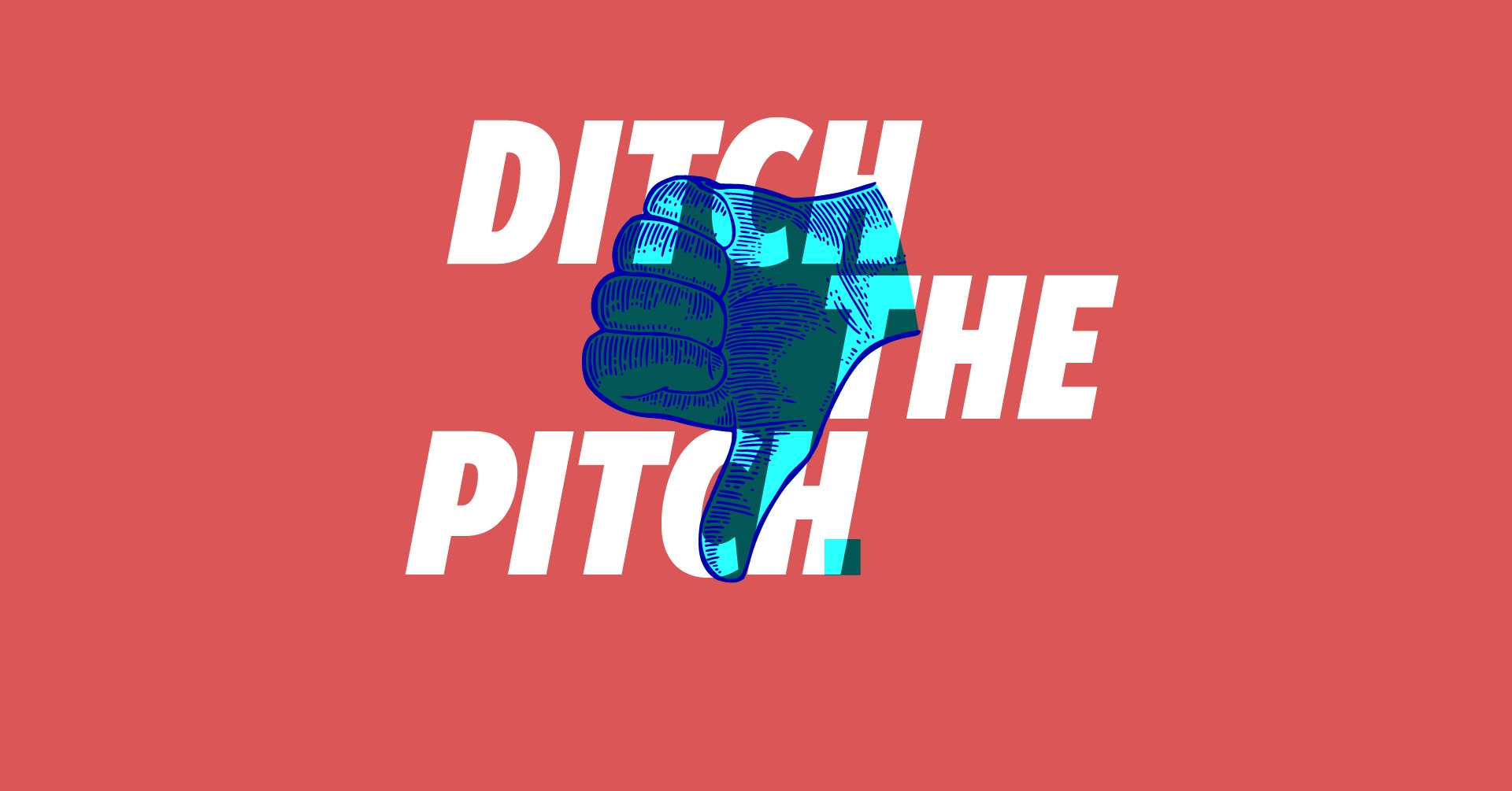We’ve taken a stand by refusing to engage in traditional pitches.
And we’re not alone.
At the top end of the market, pitching can cost an average of $300,000 and take a year for an agency to break even. At our end of the market, the costs are much lower, but still substantial at $20,000 to $30,000. This business model is out-dated and unsustainable – it may have worked in the Mad Men era when competition was low, but it’s certainly not fit for purpose today. In fact, in the last 5 years, the number of hours pitching has actually gone up by 225% rather than down.
So, how can it stop?
It stops with agencies around the world ditching the pitch.
The pitch
Companies request pitches so they can choose the most suitable agency from a number of candidates. A pitch usually involves multiple team members presenting to the client multiple times in an attempt to prove they can meet (and exceed) the client’s campaign and/or branding requirements.
Recently, Initiative CEO Mat Baxter called out a client for making their 120-day payment terms a mandatory requirement to participate in a pitch. Anyone who did not sign was immediately cast aside, unworthy of even showing up.
Companies taking advantage of agencies before they’ve even begun working together is just one reason the ditch the pitch movement is necessary.
Traditionally, after an initial meeting, a short list of agencies are selected to come up with fully developed creative ideas, often taking weeks of preparation, all for only one of them to be given the “golden ticket”. The rest are left with a gaping hole in their budgets with no project to fill it. Since pitches are usually ultra-specific to each client, being pitched, all the work undertaken cannot be reused for another account. It’s an all-or-nothing proposition. All the hard work is, essentially thrown away, costing the agency thousands of dollars every time they don’t secure the account.
The costs however are not just borne by the losing agency – those costs are necessarily transferred to accounts that are won, as ‘overhead’ costs associated with marketing and promotion. For example, if 3 pitches are made at a cost of $30,000 each and two out of three are lost, the one winning account is consequently ‘burdened’ with the full $90,000 cost that the agency needs to make up for as part of its ‘sales and marketing costs’.
This is a lose-lose self-defeating cycle that has to stop.
The #DitchThePitch Movement
Ditching the Pitch was coined by Steve Yastrow, founder of Yastrow & Company, a successful business strategy consulting firm. His advice is to fight the traditional pitching process by improving persuasive conversations to achieve success.
Nobody wants to work for free – and working for free rarely delivers work of a high standard. On top of this, independent agencies simply cannot compete against the giants who naturally have a larger budget put aside for pitching. In this cycle, competent independent agencies who are fully capable of delivering a project or campaign are never even in the running.
Not surprisingly, 82% of agencies advocate the #DitchThePitch movement – with both big and small agencies now ditching the pitch. Charlie Carpenter, MD of CreativeBrief, says “The fact that two-thirds of brand CMOs confirmed they would still work with agencies who refused to engage in the traditional pitch is an illuminating finding and one that surely must finally give the industry permission for genuine reform,” but also argued that “very little is really changing”, potentially for fear of losing out with huge brands that are sticking with pitches.
So how can ditching the pitch benefit both sides?
Only 44% of brands/agencies surveyed (which include big names like Ogilvy, Mr. President, IKEA and Unilever) believe the traditional pitch process reveals a “true sense” of what working with an agency will be like. This figure drops to just 21% for the bigger agencies.
Typically, a pitch will involve the well dressed, client-facing C-Suite managers and not the employees who actually work on the project. When you get the most experienced and best dressed in a room, you don’t get an accurate representation of what your project will look like. This inaccurate representation can be harmful in the long run for clients who receive a different experience than they were promised in the pitch.
If you’ve seen the TV show Married At First Sight, you’ll know that a first date doesn’t paint an accurate picture of the lifetime “happiness” that comes from spending time together. (Even if you haven’t seen the series, you’ll still appreciate the premise!)
While agencies were obsessing over the success of a pitch, the practise of keeping current partnerships successful became secondary. Many media agencies are now investing time and resources to improve their existing partnerships to create long-lasting success, instead of spending their time pitching for new work. It’s been proven that agencies that spend time on making their partnerships work will generate growth.
Instead of the traditional client-agency mindset, where agencies pitch against one another to fight for the winning spot, and then re-pitch to that client to retain the working relationship over the months and years, the #DitchThePitch movement aims to see the relationship re-established as a partnership, with both sides working toward a common goal over a longer period of time.
“To truly succeed, we need to work as one team – and our agency partners are a core part of that team” – Patrick Judd, Land Rover Global Marketing & Communications Director.
A recent study reveals 67% of brands respond positively to agencies refusing to engage in a traditional pitch. This is good news for the 93% of agencies who want to see changes in the pitching process.
“Ultimate Edge Communications has been a pioneer, no longer pitching for work or the acquisition of an account.” Exclaims Aleisha McCall, Founder and CEO. “We have to be the change we want to create.”
“Whenever a client needs confirmation that we are in sync with their creative ideas, branding or positioning, we provide them all the comfort they need with a paid statement of work that includes all the details of a traditional pitch” adds McCall.
“Thus far, we have had 100% success with this approach and only in a small percentage of cases do we need to make adjustments to the original recommendations, which are catered for in the deployment stage of the campaign” explains McCall. “Our intimate, collaborative approach requires us to involve all stakeholders in the process as we iteratively bring a campaign to life.”




